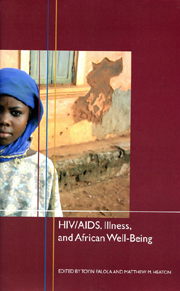Book contents
- Frontmatter
- Contents
- Acknowledgments
- Part I Context
- Part II Illness Case Studies
- 2 Waterborne Diseases and Urban Water Supply in Makurdi, Nigeria, 1927–60
- 3 Smallpox and Social Control in Colonial Saint-Louis-du-Senegal, 1850–1916
- 4 Poor Man's Trouble, Rich Man's Graveyard: A Study of Malaria and Epidemiological Sciences since the Nineteenth Century
- 5 Perceptions of Epilepsy in a Traditional Society: An Akan (Ghana) Family's Experience
- 6 Disability in Nigeria
- Part III Globalization, Development, and Health
- Part IV HIV/AIDS
- List of Contributors
- Index
- Rochester Studies in African History and the Diaspora
3 - Smallpox and Social Control in Colonial Saint-Louis-du-Senegal, 1850–1916
from Part II - Illness Case Studies
Published online by Cambridge University Press: 05 February 2013
- Frontmatter
- Contents
- Acknowledgments
- Part I Context
- Part II Illness Case Studies
- 2 Waterborne Diseases and Urban Water Supply in Makurdi, Nigeria, 1927–60
- 3 Smallpox and Social Control in Colonial Saint-Louis-du-Senegal, 1850–1916
- 4 Poor Man's Trouble, Rich Man's Graveyard: A Study of Malaria and Epidemiological Sciences since the Nineteenth Century
- 5 Perceptions of Epilepsy in a Traditional Society: An Akan (Ghana) Family's Experience
- 6 Disability in Nigeria
- Part III Globalization, Development, and Health
- Part IV HIV/AIDS
- List of Contributors
- Index
- Rochester Studies in African History and the Diaspora
Summary
Almost two decades ago, in his seminal review article of the literature on disease and medicine in Africa, Stephen Feierman noticed that although scholars had explored the relations between colonial powers and healers in the period after colonial conquest, there were no systematic studies on the actual conquest, that is, “the battle for a medical monopoly,” including the assault on the institutions of health and the persecution of the healers. A decade later, he revisited the topic, drawing on the evidence from the Great Lakes region (eastern DR Congo, northern Rwanda, and southern Uganda), and shed some light on the resistance battles led by the Nyabingi spirit mediums and diviners against European colonial rule that ended in the healers' defeat, the execution of some, and jail time or deportation for others. It was that disempowerment of African healers that paved the way for the establishment of health hegemony, in a Gramscian sense, through the mediation of indigenous agents and middlemen or cultural translators, and in the practice of mission medicine rather than directly by European medics, as scholars such as W. G. Clarence-Smith, Deborah Gaitskell, Megan Vaughan, Marynez Lyons, Richard Rathbone, David Anderson, Nancy Hunt, and John Iliffe have shown. The available evidence discussed in these studies highlights coercion, resistance, or consent as the main outcomes of the interaction between the colonizers and the colonized. However, we still do not have the full picture of the “ideological contest,” to borrow Myron Echenberg's words, which colored the colonial and missionary discourses of rationalist modernity.
- Type
- Chapter
- Information
- HIV/AIDS, Illness, and African Well-Being , pp. 62 - 78Publisher: Boydell & BrewerPrint publication year: 2007



